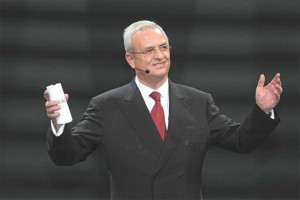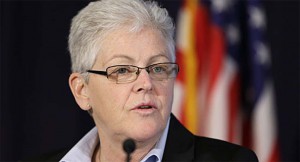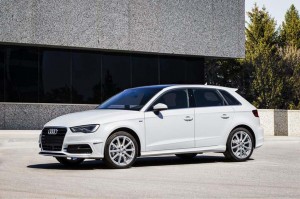Describing the settlement as “groundbreaking” and “unprecedented,” federal officials outlined a $14.7 billion, three-part deal with Volkswagen that will, among other things, remove as many as 475,000 diesel vehicles from U.S. roads.
But the agreement, which could yield significant compensation for those who own those vehicles, does not end the German automaker’s legal and financial problems. VW still has to reach a settlement covering about 50,000 additional vehicles. And it could yet face criminal charges and civil fines stemming from its efforts to cheat on government emissions tests.
The settlement “marks the largest clean air mitigation step in the history of the Clean Air Act,” declared Deputy U.S. Attorney General Sally G. Yates during a news conference in Washington, D.C. But, she added, “It is by no means the final step.” Among other things, she added, “I can assure you our criminal investigation is active and ongoing.”
The scandal erupted last September when the U.S. Environmental Protection Agency charged VW with using a so-called “defeat device” capable to detecting when a vehicle equipped with one of its 2.0-liter diesel engines is undergoing emissions tests and then adjusting controls to reduce the production of particulates and smog-causing oxides of nitrogen.
The automaker quickly acknowledged the subterfuge and subsequently confirmed it also had cheated on emissions tests involving a 3.0-liter diesel used in Volkswagen, Audi and Porsche-branded vehicles.
(German authorities investigating role of former VW CEO Winterkorn. Click Here for the latest.)
The settlement that was submitted to the U.S. District Court in San Francisco this morning covers only the roughly 475,000 vehicles using the smaller engine. An agreement covering the larger diesel is still being negotiated.
“We’re holding Volkswagen responsible for distorting the market for clean cars,” said Gina McCarthy, the head of the EPA, who called the settlement “unprecedented,” and a “groundbreaking achievement.”
The agreement has three basic components:
- A vehicle buyback and owner compensation provision that could cost VW as much as $10 billion;
- A $2.7 billion environmental remediation provision that will help offset the higher emissions of the VW diesel vehicles by helping all 50 states and some Indian tribes replace older, dirtier diesel vehicles and equipment with newer, cleaner technology; and
- A provision meant to encourage public adoption of zero-emissions vehicles.
The latter portion of the settlement will require Volkswagen to spend $2 billion over the next 10 years on such things as public battery-car charging stations, education, and programs to boost ride-sharing in battery-electric vehicles and other zero-emissions vehicles.
But the biggest piece of the settlement is to meant to “ensure consumers are adequately compensated as well as motivated to get those cars off the road,” said EPA’s McCarthy, referring to the 2.0-liter diesels VW sold during the 2009 through 2015 model-years.

The Dept. of Justice is working closely with German authorities who are now investigating former VW CEO Martin Winterkorn.
(New crash test stymies automakers. Click Here for the story.)
The deal calls for individual owners – as well as past owners and lessees – to receive as much as $10,000 in compensation. Meanwhile, the automaker will be required to offer to buy back those vehicles at fair market rates in August 2015, the month before the scandal broke. Since then, industry data show, the price of those vehicles has fallen by an average of around 20%. Depending upon the model, the buyback could cost as much as $44,000 per vehicle.
Owners will alternatively have the option to retain the vehicle and get it fixed for free. That is, fixed once Volkswagen actually comes up with a repair strategy acceptable to the EPA and the California Air Resources Board which maintains its own vehicle emissions rules. While VW is already fixing the 2.0-liter diesels in Europe and other parts of the world it has yet to figure out a solution for the U.S. which has especially stringent diesel emissions standards.
Part of the challenge is coming up with a solution that will meet that mandates while continuing to offer owners the high mileage and good performance that VW initially promoted for its diesel models.
According to a senior source at VW, the cost of the settlement was already worked into the $18.2 billion write-down the maker took on its 2015 earnings. But it remains to be seen how much additional fines and costs VW will face going forward.
Those could include a settlement covering the 3.0-liter diesel, and the cost of dealing with additional criminal and civil litigation. The new settlement also doesn’t cover some lawsuits filed by individual owners, and VW is defending itself against claims filed by its dealers and stockholders.
Separately, the maker is under civil and criminal investigation in Germany and other countries and faces owner lawsuits abroad, as well. Industry analysts say it could yet spend billions of dollars more before the diesel scandal is finally in the automaker’s rearview mirror.
(VW could face $10s of billions in additional compensation costs. Click Here for the story.)



I think it is a laugh that people bought VW diesels expecting good performance. Do this things get to 60mph in under 10 seconds? It also makes me wish I had purchased that Cayenne diesel the salesman was trying to talk me into a couple years ago.
The statement “The automaker quickly acknowledged the subterfuge” is not quite accurate (see link.) VW released a December 2014 recall was a patch to make the fraud work better while EPA and CARB were asking about the problem.
Apparently the “cheat-diesel” code would sometimes, by accident, enable the emissions controls and that led to some early emissions equipment failure. So VW announced the recall would fix the emissions equipment failures only it did it by enabling the cheat logic even more often to turn off the controls.
“Quickly” would have been admitting the problem in December 2014 and saving a years worth of cheat-diesel sales.
Bob Wilson, Huntsville, AL
Bob, fair point, and VW hid the issue for years. But it quickly relented as soon as the EPA went public with its accusation.
Paul E.